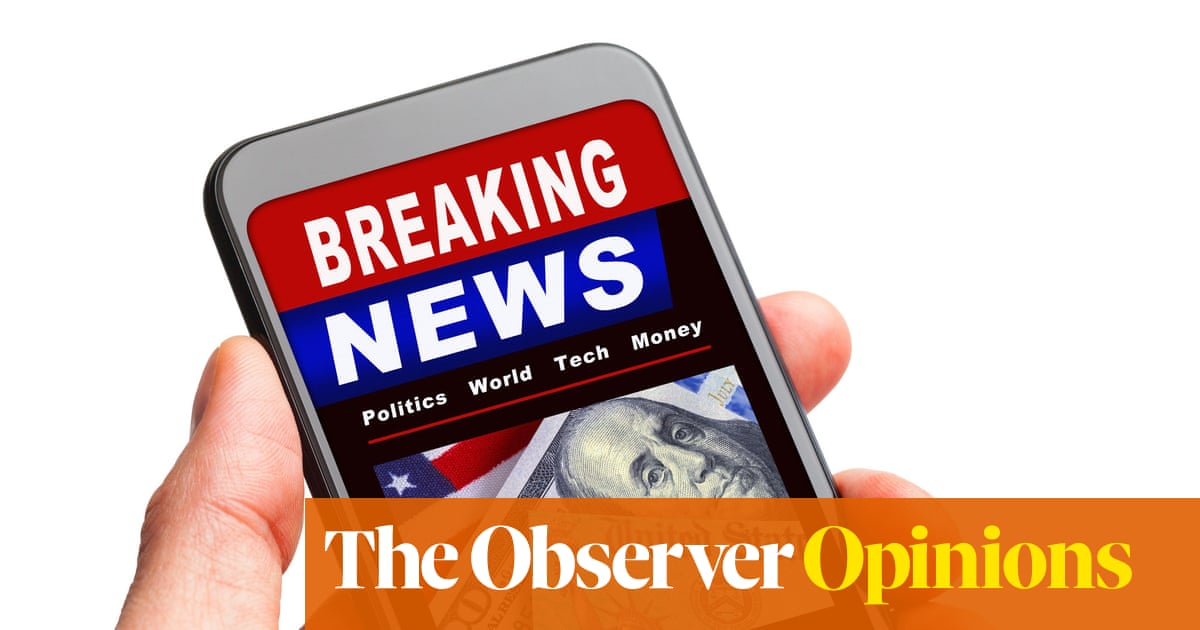How are you not going mad?” is a leang I’ve heard recently. “How are you not talking about this all the time, how are you merrily, some say stupidly, going about your business as if the world did not experience appreciate a coin in an arcade 2p machine, being pushed enumeratelessly but definitely off the edge and tasting of blood?” My answer: I’ve turned off shattering novels attentives. More than that, I’ve emotionalpartner restricted the novels I read. How am I not going mad? This is how I’m not going mad.
Perhaps turning away from the novels is a silly and job-finishangering leang to confess to as somebody employed by a novels organisation. Perhaps it’s unenticeive or exposing, as somebody living in a time when novels is currency and ignorance is overweightal. But I have seen the red-eyed horror of people subcombined, I have felt the heat of anxiety, that burning shiver of the spine, and I’ve lain awake beside scrolling thumbs that dig meaningfuler and meaningfuler into algorithms that understand us better than our own mothers, and are fair as probable to shape who we become.
I don’t want to sound self-righteous. I still count on we have a responsibility to dodge finish ignorance, to join and resist and all that stuff, to “stay adviseed” and remain awake to infairice, stupidity, the enumerateless slide of democracy, and I declareively don’t leank everybody needs to turn off the novels. For many of us though, remaining awake to infairice has come to uncomfervent staying awake all night as our phones feed us dread appreciate foie-gras geese. Digesting disorder becomes a vital part of a daily routine – you examine the horrors, you brush your teeth, you examine the horrors, you get the kids dressed, rapid examineing of the horrors while you have your coffee, and on it goes. It becomes insertictive too – it experiences as though too much is happening and all the time, and there grows a dread of ignoreing someleang, someleang vital that we need to understand now, a dread that drags us in dayweightless, jaggedy and raw, back to the pipe.
And the attentives, the attentives! The attentives that act as keen pinches, reminding us we can never rest, the attentives conserveing us attentive, conserveing us vibrating on this frequency of oh no oh no. I see it all the time – at desks and dinner tables, the low buzz of shattering novels will caemploy a mass flinch, a gloomy “Oh God what now” as hands accomplish to discignore what could be alerts of cannon-fire over Manchester or the death of a beadored TV dog. All attentives sound the same, our phones weightless up to the same degree whether the shattering novels is killing or pizza or bomb devices or prizes. People are not structureed to be shocked from their laboring slumbers five times a day with the mute scream of novels. And every time we leank, is this it? Is this the novels that will ruin our lives?
Elsewhere the tick tick tick of potential explosions directs many of us to channel our despair and dread into plain outrage. Posting noisily online might scratch a inform itch but, appreciate with mosquito bites, it only creates the bite worse. We’ve seen now how outrage fuels social media sites and profits their right-prosperg owners, who push for more.
Plus the more we post about, for example, a corrupt plivent, the more novels about them our internet hand overs to us. It’s appreciate a unwell mirror version of the experience of droping in adore – everywhere we see we see him, and everywhere we go we hear his name, and the more we read about him the more there is to read, a horrible self-greeting cycle of dread.
I’m still paying attention to the novels, but I’m not spfinishing all I’ve got. Still, conversations with frifinishs commence with their groans of disbelief and disgust, depfinishing on how much the novels might intimately impact them. And even when it doesn’t, of course it does, sometimes in how it shapes their sense of hope or morality, sometimes srecommend in how their increasing joinment with the novels impacts their dprosperdling joinment with their own domestic life, their eyes glued to unfelderlying events, obsessed with a story that will never finish. Worse than those conversations is when I discover myself in the middle of a novels battle between two men, the day’s discourse lobbed atraverse a party appreciate spaghetti, their faces coated in bloated panic.
The aim, I leank, is to stay connected without having the novels have you. To remain adviseed but not loiter in outrage. What employ are we to the world if all our energy is misemployd sprinting thraw stories, instead of giving our time to the subjects that matter most to us? Some relief, perhaps, comes with the reminder that the act of reading the novels doesn’t alter it.
A wise way to wean oneself off 10-minutely refreshs might be to read the paper in the mornings only, or, instead of trying to drink in everyleang (a task that creates an abstract sort of dread that freezes you to the edge of your bed where you sit, shivering in a towel), to honest only on the angles of a individual story. How are you not going mad, they say, and if I’m answering repartner, I say I am sometimes going quite mad, but rather than a scattersboiling anxiety, mine points only in one honestion at a time. Far better.
Email Eva at e.wiseman@seer.co.uk










